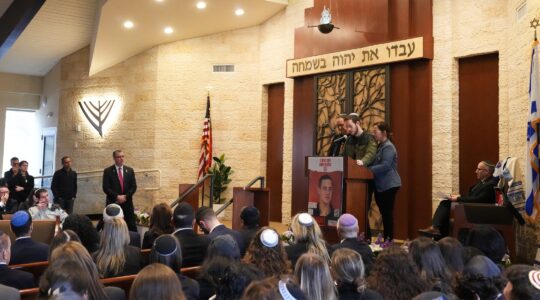JUF News
CHICAGO, March 24 (JTA) — U.S. District Judge David Coar will decide next month whether Bronislaw Hajda, 73, of Schiller Park, Ill., lied to U.S. immigration officials about his alleged service in the Nazi SS during World War II. If convicted, Hajda, a retired machinist, will lose his U.S. citizenship and could face deportation to his native Poland. Hajda immigrated to the United States in 1950 and became a U.S. citizen in 1955. The U.S. Department of Justice’s Office of Special Investigations suspects Hajda of serving as an armed guard at the Treblinka labor camp in Nazi-occupied Poland and participating in the one-day massacre of hundreds of Jews when the camp was liquidated July 23, 1944. Hajda contends that he was a prisoner from 1942 to 1944 at a Nazi labor camp in Pustkow, Poland. According to Charles Sydnor Jr., an expert on German history who served as a government witness in the trial, five former Treblinka guards testified to the Soviets after the war that a man named Bronislaw Hajda was a guard at Treblinka who helped round up and murder Jews when the labor camp was liquidated in 1944 as the Red Army was approaching. Hajda’s sister, Kazimiera Mrozinska, who lives in Poland, also signed statements claiming that her brother served as an SS guard. While she now denies signing any statements, OSI handwriting experts have determined that the signature is hers. While there were no eyewitnesses to place Hajda at Treblinka, two survivors testified to the atrocities they encountered at the labor camp. When armed guards converged on the camp, the Jewish prisoners were ordered to lie face down on the ground in the roll call area. Nearly all were shot to death in a nearby forest. “It was a living hell. Nothing can compare to it,” said Simon Friedman of Florida, one of the Treblinka survivors who testified. Friedman was shot twice and left for dead during the massacre. He then escaped. Both Friedman and Fred Kort of California, the other Treblinka survivor who testified, maintained that their duty was not to convict Hajda, but to tell what they experienced at the hands of the Nazis. “My business is to tell the truth of what happened there,” Friedman said. In all, thousands of prisoners died at the Treblinka labor camp, and more than 800,000 people, mostly Jews, were killed in the nearby Treblinka death camp.

Help ensure Jewish news remains accessible to all. Your donation to the Jewish Telegraphic Agency powers the trusted journalism that has connected Jewish communities worldwide for more than 100 years. With your help, JTA can continue to deliver vital news and insights. Donate today.





